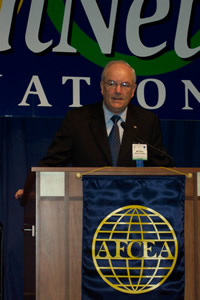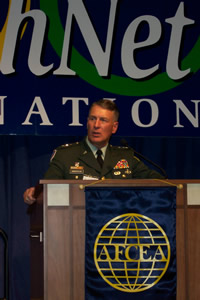Thursday, May 13, 2004
SIGNAL’s Online Show Daily
TechNet International 2004
Day 3 Quote of the Day:
“Let there by no doubt that we are at war … in the United States.”
—Lt. Gen. Edward G. Anderson III, USA, deputy commander, U.S. Northern Command and vice commander, U.S. element, North American Aerospace Defense Command.
The third and final day of TechNet International 2004 featured blunt and direct talk from two speakers—one civilian, one military. Leading off with the breakfast address was Michael Wynne, acting undersecretary of defense for acquisition, technology and logistics.
Instead of focusing largely on the successes of network-centric warfare, Wynne spent a considerable amount of time discussing his views on shortcomings and impending perils facing the military and the country as a whole. The country is “making a big bet” on network-centric operations, but pitfalls loom. He warned that the military is in danger of “proliferating gaps” as it moves ahead with new systems.
 |
| Michael Wynne, acting undersecretary of defense for acquisition, technology and logistics, alerts the TechNet International 2004 breakfast audience to potential challenges that loom in the near future. |
Asking why software-dominated projects are managed so poorly, Wynne stated that software is not made perfectly the first time because standard rules such as configuration control are not being followed. This situation is worsened by the loss of engineering talent across the board in the United States. Foreign students, instead of staying in this country and contributing their professional expertise, are returning to their own countries and sparking a renaissance of innovation that threatens U.S. competitiveness.
“Quality is rampant in Bangalore, India, in Singapore and in Japan,” he observed. Wynne warned that the United States dominated the high-technology marketplace by a rush to market—just as it did the automotive industry several decades back. Now, overseas innovators that focus on quality threaten to overtake the U.S. high-technology industry as Japanese car companies did to the U.S. automotive industry over time.
In addition to his warnings, Wynne also offered some suggestions for future forces. He called for “the metrification of littorals” by embedding sensors throughout vital littoral regions, including the United States. These measuring devices would function like the sound surveillance system, or SOSUS, that tracked submarines from the bottom of the Atlantic Ocean, only they would be less expensive than SOSUS. Radio frequency identification tags on ships would be tracked by buoys as the vessels neared the coastline.
The final day’s Luncheon speaker was Lt. Gen. Edward G. Anderson III, USA, deputy commander, U.S. Northern Command (NORTHCOM) and vice commander, U.S. element, North American Aerospace Defense Command (NORAD). As a key leader in two major commands, Gen. Anderson began his address by stating an underlying fact that defines both commands’ missions. “Let there be no doubt that we are at war,” he declared, “in the United States.”
He went on to describe the enemy that threatens the nation as well-financed, intent on hurting the country, and for whom time is of no consequence. This enemy’s intent, he continued, is for an event far bigger than the attacks on the World Trade Center and the Pentagon on September 11, 2001.
This event may feature weapons of mass destruction, he warned, adding “we know that—I’m not just speculating, we know that.”
 |
Lt. Gen. Edward G. Anderson III, USA, deputy commander, U.S. Northern Command and vice commander, U.S. element, North American Aerospace Defense Command, gives the Thursday luncheon address at TechNet International 2004. |
Temporary circumstances, which would be similar to those that arose during security measures for the Salt Lake City Olympic Games, would find NORTHCOM in a simpler assistance role. Reflecting on his NORAD and NORTHCOM duties, the general called for closer security cooperation with U.S. neighbors north and south. While Canada has been a steadfast partner in NORAD for several decades, Gen. Anderson called for expanded border security operations beyond watching the skies.
Border activities must expand beyond counterdrug efforts, he stated, adding that preliminary talks have been held with Mexico to bring that country into a border security alliance with the United States. The general observed that 400 metric tons of drugs entered the United States in 2003. That kind of activity easily could be employed to smuggle in weapons of mass destruction.




Comments